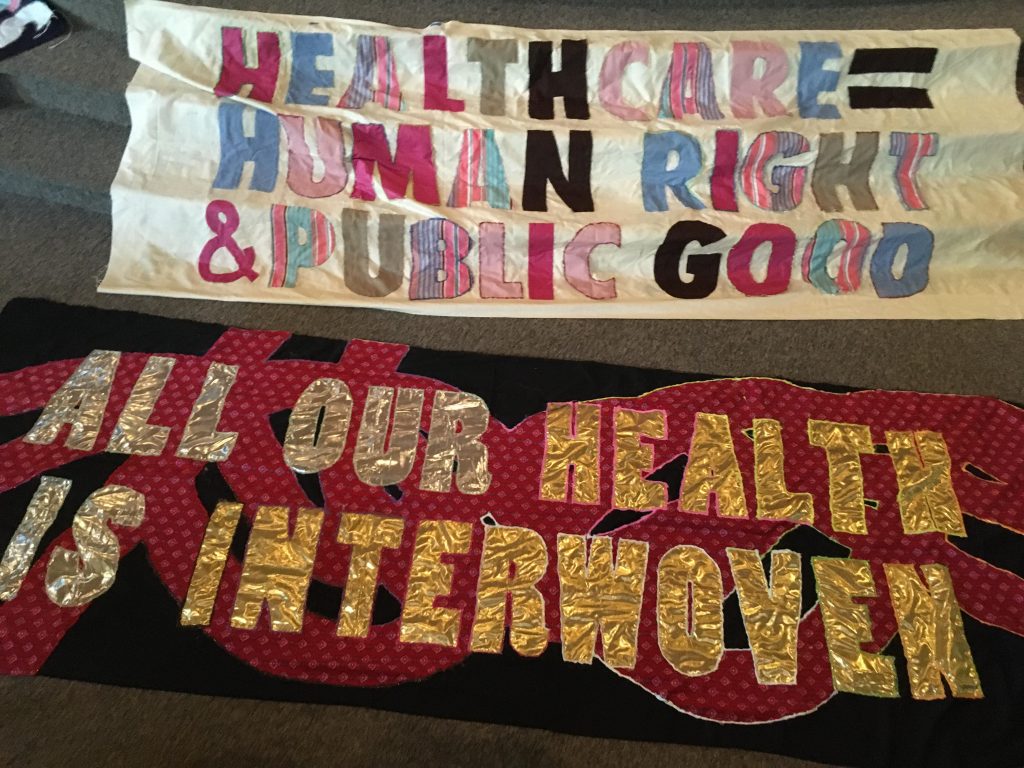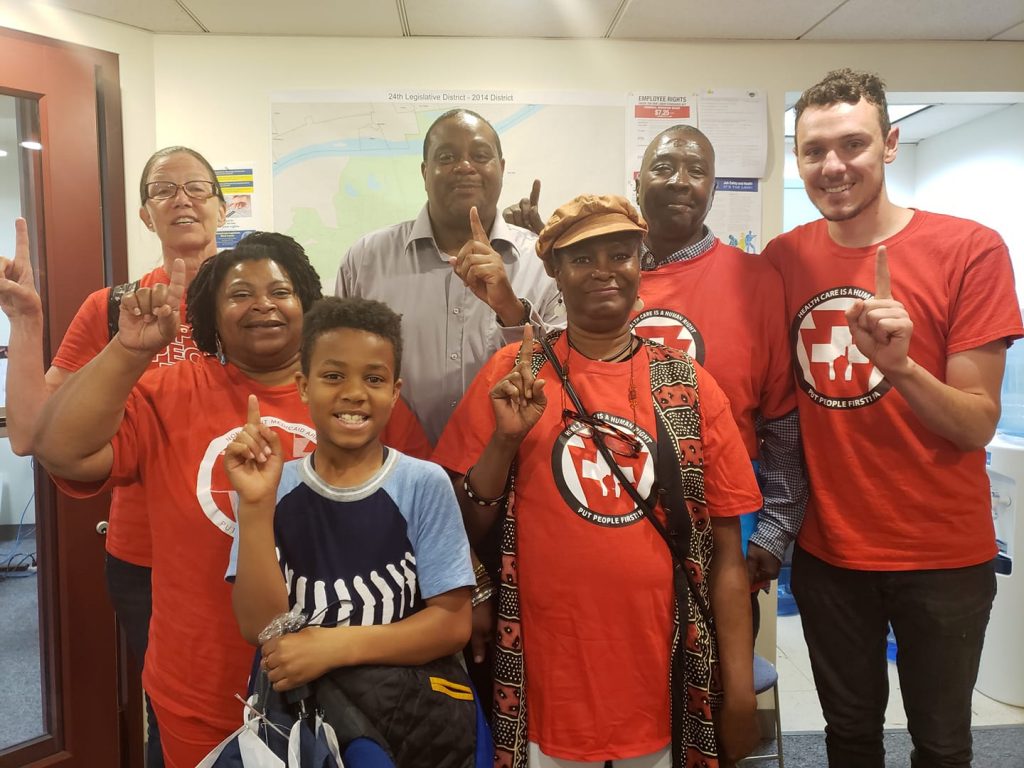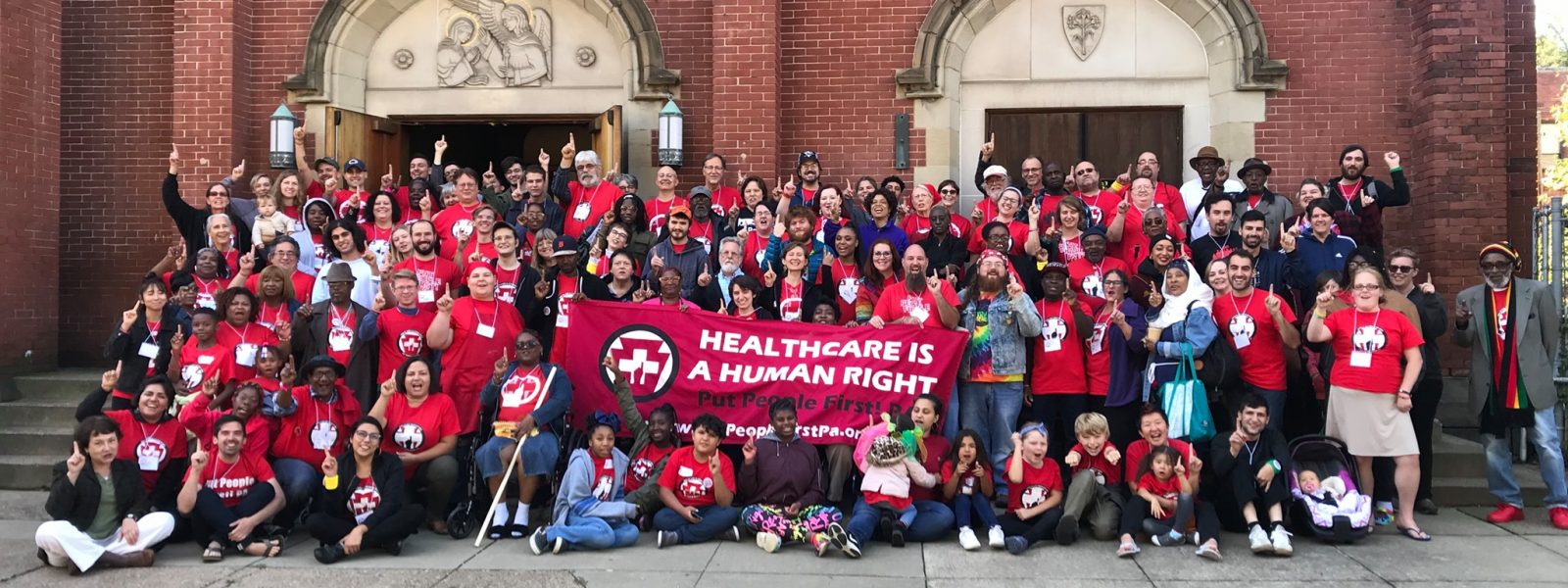Sign the Petition: We Need a Public Healthcare Advocate in Pennsylvania
Sign the petition here.
Firme la petición aquí en español.
- Download our Frequently Asked Questions here or read it below.
- Download our Public Healthcare Advocate FAQ for legislators here.
- Download our Petition for a Public Healthcare Advocate for outreach here.
- Descargue nuestra petición para un defensor público de atención médica en español aquí.
Every year across the state, millions of us in Pennsylvania struggle to get the care we need and to pay for treatments and medicine. We need a Public Healthcare Advocate to stand on the side of everyday people.

Everyone in Pennsylvania needs healthcare, but giant health care companies are lining their pockets by pricing us out of care. Hospitals and drug companies overbill us for essential treatment and medicine, and insurance companies have made a routine business practice out of refusing to cover our treatments and pay our insurance claims.
Every year, these companies force over 750,000 PA residents to delay or forgo medical care and send more than 1.8 million Pennsylvanians a surprise medical bill. More than 1.5 million of us are now in medical debt.
We the people of Pennsylvania need a Public Healthcare Advocate to help us appeal healthcare companies’ decisions to overbill us and deny us care, and to stand on our side in Harrisburg by letting public officials know how the health insurance system is and isn’t working for people and advocating on our behalf.
A Public Healthcare Advocate is a well-proven model that would make a world of difference to everyday people. Pennsylvania already has public advocates for utilities and long-term care, and Connecticut has a highly successful Healthcare Advocate that helps thousands of residents appeal medical bills and denied insurance claims, returning more than $10 million to residents every year.
Join Put People First! PA and tell Governor Wolf and State Legislators, you want a Public Healthcare Advocate!
To: Governor Wolf and State Legislators
We, the people of Pennsylvania, want a Public Healthcare Advocate to help protect our healthcare rights.
Sign the petition here.
Firme la petición aquí en español.

Public Healthcare Advocate 101
What is the office of the Public Healthcare Advocate?
A Public Healthcare Advocate is a public official (backed by a staffed office) who advocates for patients, residents, and workers in the healthcare system; helps people appeal harmful decisions by healthcare companies and state agencies; and helps lawmakers better understand and improve our healthcare system. Fundamentally a Public Healthcare Advocate furthers the goals of universality, accountability, transparency, participation and equity in our healthcare system.
Let’s define the terms: Public, Healthcare, and Advocate
What does public mean?
● Public does not mean that the office is limited to the oversight of only public insurance/entities. The Public Healthcare Advocate will have oversight over public and private providers of all kinds.
● It does mean that it is a government-affiliated office that serves all residents of the state and serves the public interest as opposed to the interests of profiteers.
What does healthcare mean?
● The healthcare of people on all kinds of plans and programs – and no
plans/programs – it includes the uninsured and those that are shut out of the healthcare system; it responds to public health crises related to state violence, environmental devastation, pandemics, etc.
What does advocate mean? Fighting for all residents to get the healthcare that they need and deserve and is their human right.
● Investigate, analyze
● Advise and assist, provide referrals
● Educate and engage communities
● Co-mediate and co-prosecute
● Collect data, inform policy and law-making
What would a Public Healthcare Advocate do?
The Office of the Public Healthcare Advocate (PHA) would play three main roles:
1. Fight for our healthcare rights at the state level, as individuals and as a class.
Engage in the investigation, mediation and/or prosecution of wrongdoing perpetuated by profiteers or government agencies that harm the health of
individuals or entire communities – particularly poor and dispossessed working class people with a specific focus on Black, Indigenous and other people of color, rural communities, incarcerated people, undocumented people, houseless people, LGBTQIA people, women and children, and people with disabilities. Compel public and private witnesses and data collection to advance this work.
● Provide people with information and assistance to defend their healthcare rights. Refer people to assistance provided by nonprofits and public agencies and, where they can’t help or don’t exist, directly support people in appealing denied coverage, denied claims, billing mistakes and other problems.
● Investigate the individual and group denial of coverage/care/excessive billing by public or private insurance and medical providers. Mediate in these cases whenever possible and prosecute whenever actions arise to the level of criminal offense.
● Intervene in the closures of hospitals and healthcare facilities to represent resident and community interests.
● Repair harm that has been created in the healthcare system or through public healthcare crises (e.g. hospital closures, prisons, environmental degradation fallout, etc.) by helping formulate legally binding remediation plans.
● Recommend legislation, policies, rules and practices to the legislature and state agencies that would address systemic problems in the healthcare system.
2. Advance community engagement and education across the state by creating more spaces for everyday people to have a direct say in healthcare decisions that affect their lives and raise public awareness on healthcare access, coverage, and rights.
● Work with community groups and the assistance of the Community Advisory Board (made up of organizations representing poor and working-class people) to uncover and report on health care problems and establish priorities for the PHA. Testify and advocate on behalf of patients in legislative and regulatory processes; convene public hearings, forums, and town halls; report on patients’ experiences and outcomes; provide input on policies; and help educate the public on their healthcare rights and benefits.
● Remove barriers to the participation and engagement of residents in healthcare provision and policy.
● Bring critical attention to structural problems like cost barriers, denial of healthcare to prisoners, healthcare impacts of environmental devastation, lack of access to dental care, overbilling, insurance-rate increases, and hospital closures that affect people’s lives but that they are unable to solve on their own.
● Work with community organizations to reach Pennsylvania’s communities that are most often denied healthcare (e.g. poor and working-class people, people of color, immigrants, rural and small-city communities, people with disabilities, people who are homeless, and people who have been incarcerated, etc.).
3. Engage legislators and governmental agencies and hold agencies and the industries they regulate accountable.
● Support lawmakers and their constituents by compelling data access, collection and standardization, and reporting of essential information on what is and isn’t working for people in Pennsylvania’s healthcare system.
● Co-create healthcare policy recommendations with the Community Advisory Board on improvements to existing benefits, processes, structures and mechanisms, and share these with the state legislature and relevant departments.
● Help draft policy, rules and legislation.
● Assist in interagency and interdepartmental coordination on healthcare matters and during public health crises.
● Ensure through investigatory and prosecutorial action state agency and department accountability.
Who would a Public Healthcare Advocate serve?
All residents, no exceptions, including people on all forms of private and public health insurance (insurance through employers, ACA plans, Medicaid, Medicare, workers’ comp, the VA, etc.), and people who are uninsured, unhoused, incarcerated, disabled or undocumented.
Are there effective Public Healthcare Advocates in other places?
Pennsylvania already has public advocates for long-term care, utilities, and employment and housing discrimination. Several other states have public advocates who hold both private insurance companies and public insurance programs accountable, like Connecticut and Nevada.
Connecticut’s Office of the Healthcare Advocate and Nevada’s Office of Consumer Health Assistance are both good models. Put People First-PA’s proposal draws from both of these models. Connecticut’s Office has strong powers to assist residents with insurance problems and to report on health injustices. It also has guaranteed funding through a tax on insurance companies. Nevada’s Office has a broad mandate to help people experiencing problems with Medicaid, private insurance, workers’ compensation, and hospitals.
Why aren’t existing appeals processes enough?
Most people don’t know what their rights are and don’t have the legal knowledge or time to successfully defend them.
Successfully appealing an “adverse decision” by a healthcare company requires patients to figure out which appeals process applies to their situation, make sense of what’s required of them, assemble large amounts of documentation, submit an appeal, and, in many cases, stick with the appeal through multiple rounds of denials.
Few Pennsylvanians know that insurance companies and multiple public agencies operate appeal processes, and fewer still ever submit an appeal, much less have one decided in their favor.
Insurance and hospital companies know this, and therefore have a financial incentive to turn overbilling and denials of coverage and claims into routine business practices.
People need a Public Advocate to help them successfully navigate appeals. What would it take to create a Public Healthcare Advocate in Pennsylvania? The State Legislature and the governor must pass a law creating a Public Healthcare Advocate.
Creation of the Office through legislation (rather than an executive order by the governor) is necessary to ensure the Public Healthcare Advocate has adequate funding and powers and to protect the Office from future political attacks.
Once a law is passed, the Public Healthcare Advocate would be appointed through a transparent process accountable to residents.
In Connecticut, for example, a Community Advisory Committee with designated seats for specific constituencies submits a list of candidates to the governor, the governor nominates a candidate from the list, and the Legislature votes to approve and appoint the governor’s nomination.
What is necessary to prevent a Public Healthcare Advocate from being weakened by the industries it is supposed to hold accountable?
The strength and independence of any public advocate depends on the strength of the legislation creating the office.
Legislation for a Public Healthcare Advocate would need to:
a) provide adequate, guaranteed funding that is protected from cuts in future years, b) give the Advocate sufficient powers to effectively serve residents, and
c) build in accountability mechanisms like a community advisory board, a transparent appointment process, and independence from conflicts of interest and elections to make sure that the Office isn’t captured by the insurance industry or swept up in partisan fighting.
Additional Resources
- Download our Frequently Asked Questions here.
- Download our Public Healthcare Advocate FAQ for legislators here.
- Download our Petition for a Public Healthcare Advocate for outreach here.
- Descargue nuestra petición para un defensor público de atención médica en español aquí.
